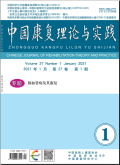中国康复理论与实践2024,Vol.30Issue(6):648-656,9.DOI:10.3969/j.issn.1006-9771.2024.06.004
虚拟现实技术对帕金森病患者认知功能和生活质量影响的Meta分析
Effect of virtual reality on cognitive function and quality of life in patients with Parkinson's disease:a meta-analy-sis
摘要
Abstract
Objective To evaluate the effect of virtual reality(VR)on cognitive function and quality of life in patients with Parkin-son's disease. Methods A systematic search of CBM,CNKI,Wanfang data,VIP,Cochrane Library,Web of Science,Embase,and PubMed was carried out to identify randomized control trials(RCT)about the effect of VR technology on pa-tients with Parkinson's disease from inception to February 29th,2024.The control group received routine cogni-tive training,balance training or physical therapy,and the experimental group received VR technology.The quali-ty of articles was evaluated using the Cochrane Collaboration's 5.1.0 RCT risk assessment tool for bias.The meta-analysis was performed using Revman5.4.GRADE was used to evaluate the evidence quality of outcome indica-tors. Results A total of 13 literatures involving 426 patients were included.Allocation concealment and blind methods were not described in most literatures,and selective reporting of research results or other biases was unclear.VR tech-nology could improve the Motreal Cognitive Assessment(MoCA)score(MD=1.11,95%CI 0.31 to 1.90,P=0.006),Trail Making Test(TMT)-A score(MD=-6.25,95%CI-11.71 to-0.78,P=0.030)and depression scale score(SMD=-0.56,95%CI-0.95 to 0.18,P=0.004)of patients with Parkinson's disease;however,it did not improve TMT-B score(MD=-6.01,95%CI-28.16 to 16.14,P=0.590),Unified Parkinson's Disease Rat-ing Scale(UPDRS)-Part II score(MD=-2.11,95%CI-4.97 to 0.75,P=0.150)and Parkinson's Disease Ques-tionnaire(PDQ-39)score(MD=-0.92,95%CI-4.03 to 2.19,P=0.560).For quality of evidence,MoCA score,UPDRS-Part II score and PDQ-39 score were low,and depression score and TMT score were moderate. Conclusion VR technology can improve the cognitive function and depression of patients with Parkinson's disease;how-ever,no significant improvement is found in activities of daily living and quality of life.关键词
帕金森病/虚拟现实/认知功能/生活质量/Meta分析Key words
Parkinson's disease/virtual reality/cognitive function/quality of life/meta-analysis分类
医药卫生引用本文复制引用
吕美玲,王洁,曾维斯,温晓婷,楚鑫..虚拟现实技术对帕金森病患者认知功能和生活质量影响的Meta分析[J].中国康复理论与实践,2024,30(6):648-656,9.基金项目
成都中医药大学教育教学改革项目重点项目(No.JGJD202356) Supported by Education and Teaching Reform Project of Chengdu University of Traditional Chinese Medicine(No.JGJD202356) (No.JGJD202356)

